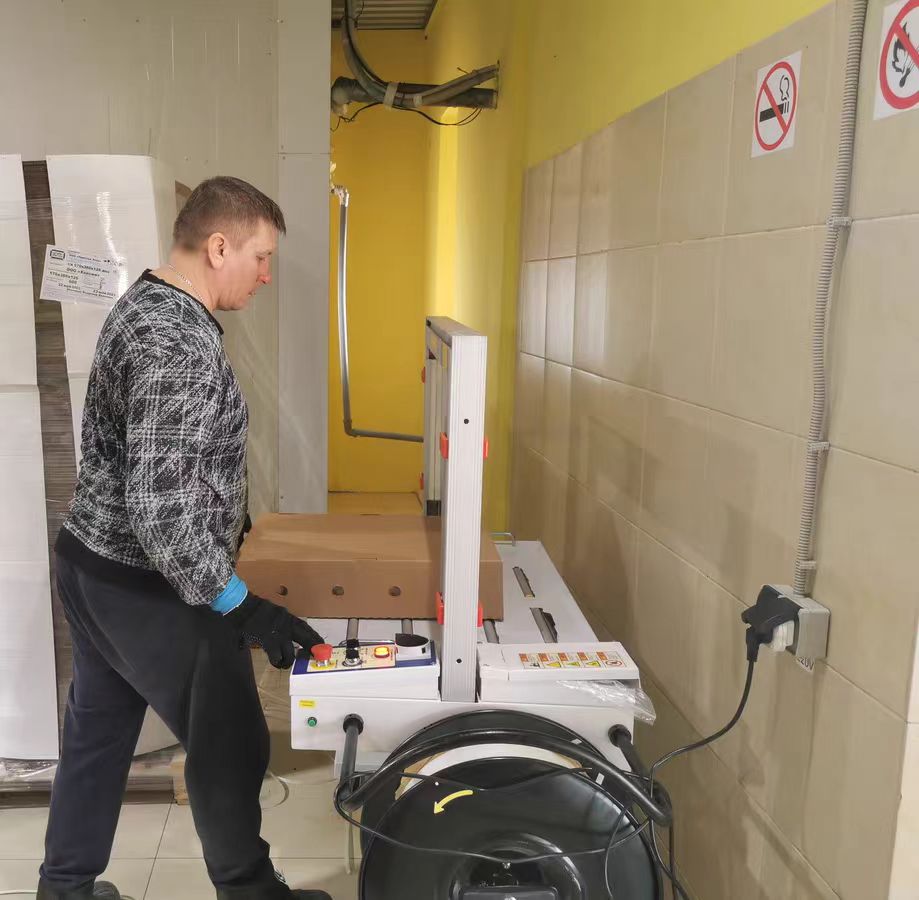 Packaging Efficiency Tripled! Fully Automatic Strapping Machines Become New Cost-Saving Powerhouse for Enterprises
Packaging Efficiency Tripled! Fully Automatic Strapping Machines Become New Cost-Saving Powerhouse for Enterprises
Warehouses once saw workers bending over to pack goods inefficiently, while business owners worried about rising packaging costs and logistics damage... Today, one machine is revolutionizing this landscape.
"Manual packing simply couldn’t keep up with peak e-commerce seasons!" remarked a logistics warehouse manager recently. "Since introducing fully Automatic Strapping Machines, packaging efficiency has increased by 300%, labor costs dropped by 40%, and customer complaints about damaged goods have nearly vanished."
In an increasingly competitive market, efficient and reliable packaging has become a critical breakthrough for cost reduction and productivity. As the core equipment of modern intelligent packaging, fully automatic strapping machines are reshaping production workflows across industries with revolutionary advantages.
Fully automatic strapping machines are far from single-industry tools—their applications span the vast majority of modern commercial and industrial sectors. Through intelligent automation, they adapt tension and binding methods based on product characteristics, ensuring precise packaging.
In logistics and warehousing, they handle thousands of daily shipments. From small parcels to large furniture or appliances, items are quickly and uniformly bundled into standardized units, streamlining subsequent handling, stacking, and storage.
For e-commerce businesses facing massive order volumes, these machines are lifelines. They seamlessly integrate with sorting systems and loading processes, ensuring every package is securely strapped during peak seasons—preventing losses and complaints from transit damage.
In manufacturing, they are indispensable. On production lines for automotive parts or electronics, they rapidly bundle finished or semi-finished products, facilitating counting, sorting, and storage while maintaining workflow efficiency.
In food processing, hygiene equals efficiency. With fully enclosed stainless-steel designs, they prevent contamination while guaranteeing seal integrity and aesthetic appeal—directly elevating brand image.
In construction, specialized automatic rebar tiers complete one bind per second, replacing manual labor. Suitable for beams, slabs, columns, and stairs, they boost project efficiency by over 3×.
The core strengths of automatic strapping machines lie in their revolutionary technical specs and smart engineering, translating directly into user benefits.
Lightning-Speed Operation:
High-end machines complete one strap cycle in 1.5 seconds, handling up to 40 straps per minute. In logistics, this means bundling dozens of boxes per minute—eliminating packaging bottlenecks during peak hours.
Intelligent Adjustment System:
Via electronic panels, operators easily customize tension (2.5KG–70KG) for everything from delicate prints to heavy building materials. Smart controls monitor each cycle for optimal results.
Exceptional Durability:
Hardened blades (65 HRC) ensure long-term cutting reliability. Core components like French "TE" and Japanese "OMRON" international brands guarantee precision and stability.
Unmanned Continuous Production:
Equipped with auto-detection, strapping, and conveying, they operate 24/7 without interruption. One machine replaces 3–6 workers, slashing labor costs and management burdens.
Eco-Friendly Design:
Optimized structures and high-efficiency motors reduce energy use by 30%+. Compatibility with eco-degradable straps minimizes plastic waste, supporting green initiatives.
Adaptive Flexibility:
Modular design supports multiple strapping modes (parallel, vertical, reinforced). Strap specs adjust flexibly (width: 9–19mm; thickness: 0.5–1.5mm), auto-adapting to product dimensions for diverse needs.
When technical strengths translate to real-world gains, automatic strapping machines deliver remarkable outcomes across sectors:
An international logistics hub boosted daily handling from 80k to 220k packages, cutting labor costs by 60% and reducing transit damage from 3% to <0.5%.
A mid-sized food plant saved 15 packaging workers after installing strapping equipment. Product appearance improved dramatically, with supermarket returns dropping 90%—recouping costs in 3 months.
At a Zhejiang construction site, automatic rebar tiers increased daily output per worker from 1k to 3.5k binds. Projects finished 45 days ahead of schedule, lifting profit margins by 8%.
A building materials firm used heavy-duty strappers for large panels, increasing transport space utilization by 25% while eliminating in-transit accidents—achieving record customer satisfaction.
As Industry 4.0 unfolds, automatic strapping technology is evolving rapidly. Next-gen devices integrate IoT and big data, enabling real-time monitoring, predictive maintenance, and auto-optimized settings.
Modular design is now mainstream—users start with basic setups and expand functionality later. This flexibility democratizes automation for SMEs.
Eco-models are gaining traction, with machines compatible with biodegradable bio-materials capturing growing market share. They meet consumer expectations while advancing corporate responsibility.
Most compellingly, mass production and localized supply chains have driven prices down. ROI periods now shrink to 3–6 months, making these among manufacturing’s fastest-paying automation investments.
A building materials executive crunched the numbers: "Monthly packaging labor costs were ¥120k; transit damage payouts hit ¥50k. After switching to automatic strapping, three months of savings covered the equipment cost—not counting new orders from happier clients."
Looking ahead, continuous innovation will make these machines smarter, more efficient, and greener. The revolution has only just begun.
Mobile:+86-18206519878
Tel:0086 18206519878
Whatsapp:008618206519878
Email:sales@kbwmachinery.com
Add:Wanda Plaza, Fuqiao Street, Rencheng District, Jining City,Shandong Province,China